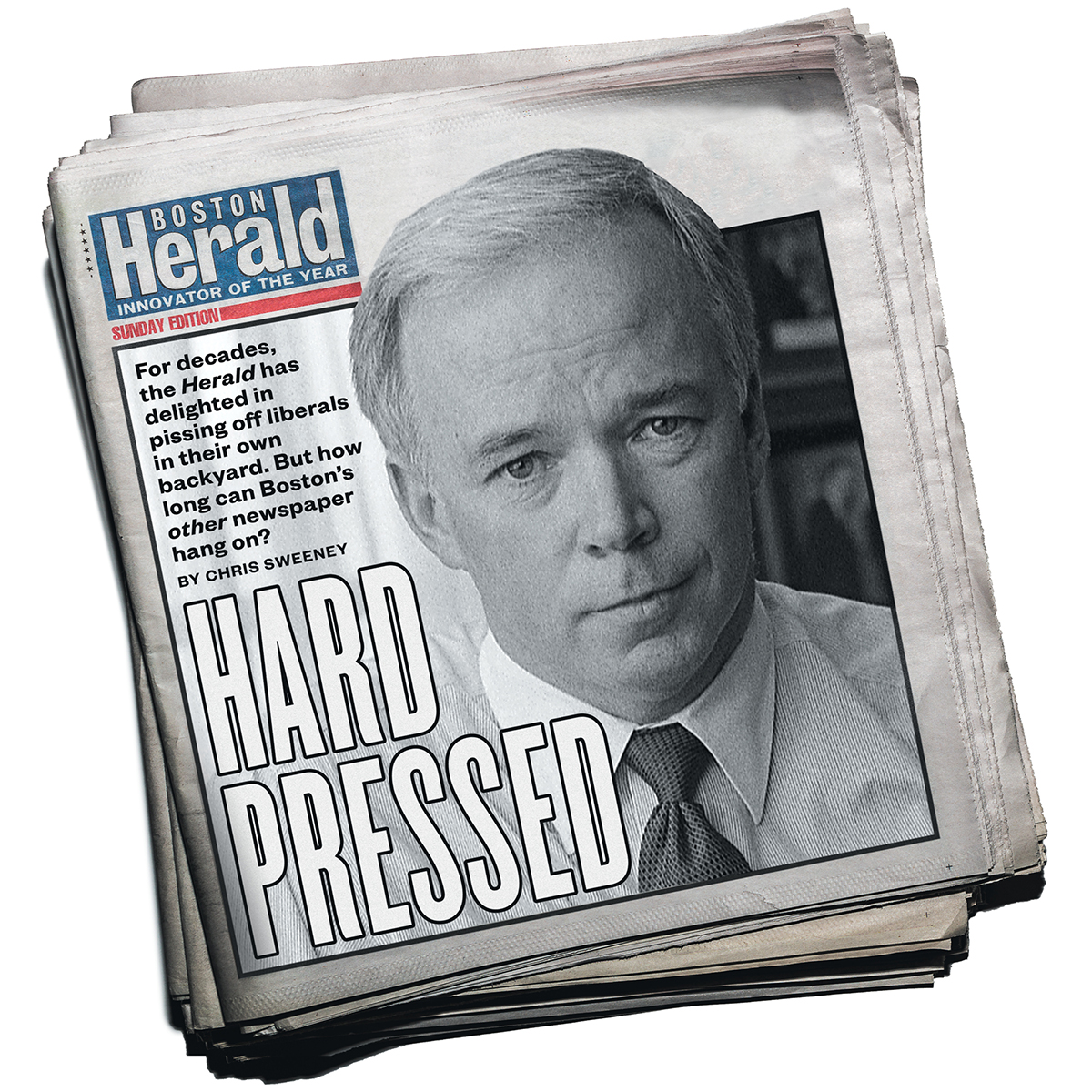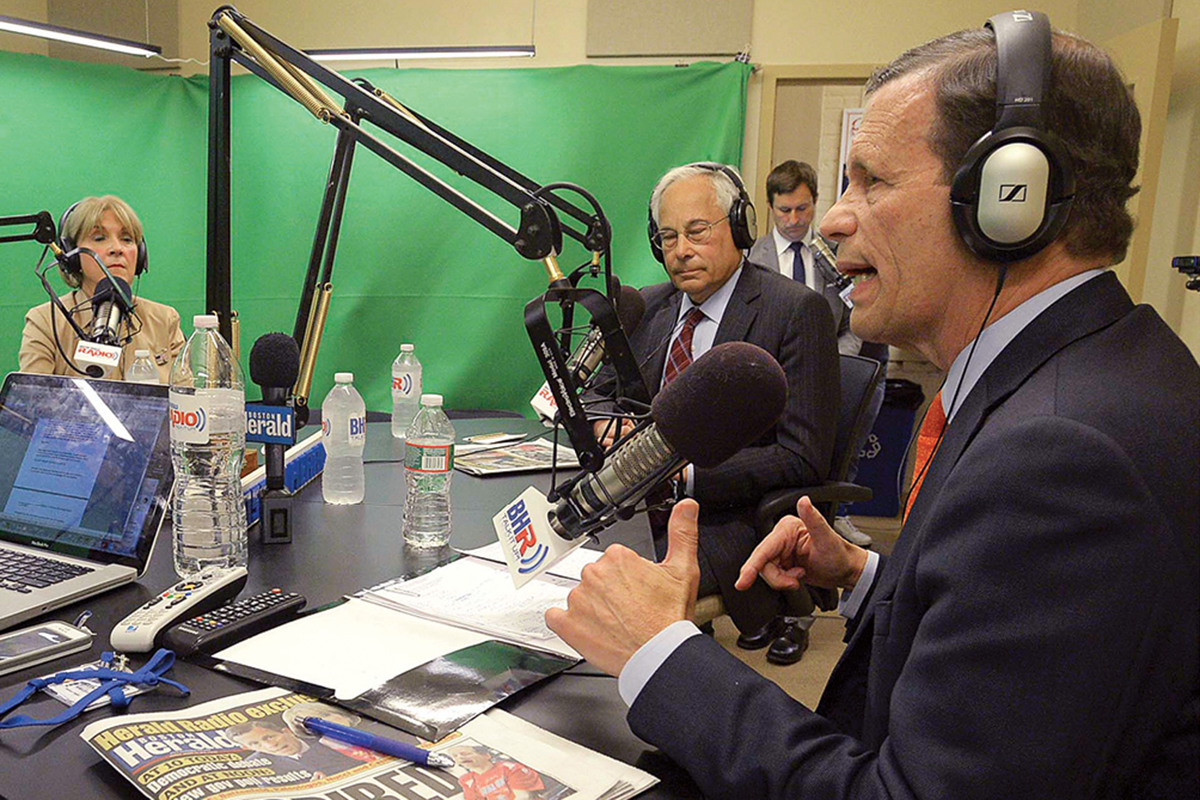Hard Pressed: Will the Boston Herald Survive?

As longtime Herald owner and publisher Pat Purcell pushes 70, the future of his tabloid is uncertain. / Photo illustration by Toan Trinh, portrait by Eric Antoniou
I’m hunting for Herald readers.
It’s 8 a.m. on a dreary Friday in late March, and a stream of commuters is pouring through South Station. The first target to land in my cross hairs looks to be in his sixties and stands well over 6 feet, with a mop of unruly white hair and a face full of busted blood vessels. Peeking out from the papers stuffed under his left arm is the blue Boston Herald masthead. Splashed on the right side of the front page is the headline: “Beware ‘Felony Lane Gang,’” with a short teaser about a crew of checkbook snatchers. On the left side is a portrait of a Mission Hill college-hoops fan who dresses like Flavor Flav and suddenly found fame when his March Madness celebratory antics went viral.
“Excuse me, sir,” I say, approaching my mark. My voice jumps an octave in hopes of softening the ask: “I’m a reporter with Boston magazine looking to—” Before I can finish, he scowls, “Not interested” and uses the folded tabloid like a nightstick to shoo me away. It’s exactly what I expected of a Herald devotee—old, white, and pissed off, a lumbering relic from an era of Boston that’s heading to the grave and seemingly taking the city’s second paper with it.
Now, it is true that the Herald still regularly scoops the Boston Globe and remains an ink-stained thorn in the side of City Hall, calling Mayor Marty Walsh a “union thug” and poking holes in the city’s plans to host an IndyCar race. And the company’s in-house Internet radio station has been roundly praised by the industry as a digital disruptor, while its website typically pulls in more than 700,000 page views a day. But with the ascent of plush condos, moneyed millennials, and a daily level of political correctness that would make George Orwell’s worst fears seem like an episode of Peppa Pig, the city now more than ever is at odds with the very soul of the conservative tabloid, a newspaper that uses the word “illegals” like it’s a sport and was trolling before trolling was even a thing. How the paper has survived this long seems like a mystery.
What’s crystal clear about the Herald, however, is that no one in charge is interested in answering my questions. Owner and publisher Pat Purcell declined an interview through a company spokeswoman, as did editor Joe Sciacca, who spent more than 25 years burning shoe leather before taking over the top post. More than a dozen other employees told me to go screw or simply didn’t respond to voice messages and emails. “I can’t have my nose near this shit,” one reporter grumbled before hanging up. Some, however, were kind and desperate enough to send bleak dispatches from the Herald’s newsroom and meet for drinks to spill the beans, but more on that later.
Since no one at the Herald welcomed me through the front door, I decided to head over to South Station looking for folks who are spending $1.50 on the dead-tree daily. Seated near the food court is Gidget Gaines, a 48-year-old MBTA conductor with a pierced nose who says she’s been reading the Herald for three decades. For Gaines, it’s not about the right-wing ramblings of the op-ed page or the crime scoops—it’s about the shape. The unwieldy broadsheets of the Globe, which she also peruses daily, are a hassle in crowded train cars and cramped conductor booths. The Herald is “fast and easy,” Gaines says. Half a dozen other readers echo this same sentiment, including a fiftysomething redhead who looks like she could be Julianne Moore’s sister. “Easy to hold, easy to read,” she says.
As the stream of commuters slows to a trickle, I meet Robert Johnson, a 72-year-old attorney who identifies as left of center. He applauds the Herald’s sports page and takes in Howie Carr for a laugh. “I find the Herald to be sometimes crass and harsh,” Johnson admits to me. So why buy it? “It’s important to know what the other side is thinking—you know, to understand the opposition.”
In the bleeding heart of Greater Boston, the Herald has always been the opposition, the scrappy defender of Joe Sixpack that throws haymakers at bumbling bureaucrats. It famously submarined former Lieutenant Governor Evelyn Murphy’s political ambitions in 1989 by tracking her down in Florida and snapping pictures of her jogging on the beach while the city was being hammered by brutal winter weather and in financial distress. It ignited debate with a front page showing a photo of the lifeless Victoria Snelgrove, the Emerson College student who was accidentally killed by police while celebrating the Red Sox’s 2004 ALCS win over the Yankees. “Triumph and Tragedy,” the headline read.
Like so many newspapers, though, it’s a shell of its former self. Purcell sold off the Herald’s once spacious newsroom in the South End and downsized to tighter quarters in the Seaport District; the union is fielding an increasing number of complaints from reporters about management; and the Inside Track—a once-cherished house of gossip—has been slashed in half, to a single page. Recent Sunday editions have had fewer than 60 pages, while weekday circulation has dropped from 245,000 to 88,000 over the past decade.
A privately held company, the Herald’s finances are not public, but the hallmarks of decay are glaring. Make enough phone calls to media experts and to Herald staffers past and present, and you’ll hear the same thing: Purcell has cut every possible cost and made the paper debt-free. “I don’t know how Pat Purcell feels about unions,” Bill Brotherton, the editorial head of the Herald’s union and the current copy-desk chief for the features department, writes in an email. “I can guess that he’s not a big fan. Our union local and the company don’t always see eye to eye, but we all want the same thing. We want the Herald to thrive and be profitable. That’s good for us and it’s good for Boston.”
It is good for Boston—really good. Imagine a Boston where the only newspaper in town is owned by a nerdy billionaire who also owns the Red Sox and a European soccer team. Awful. Sadly, though, it’s no longer about competition; it’s about survival. Consider that the Herald is printed by the Globe and delivered on the same trucks. When I call the Globe’s CEO, Mike Sheehan, to get his thoughts on our two-newspaper town, the first thing he points out is how important a customer the Herald is for the Globe’s printing business. “They used to throw Molotov cocktails at each other,” quips Jonathan Klarfeld, an associate professor of journalism at Boston University. “Now the Globe prints the Herald’s first edition.”
Having lived much of its life on the ropes, the Herald is no stranger to tough times. The staff is socialized for scarcity and accustomed to shoestring budgets. There’s no doubting Purcell’s commitment to maintaining a voice and viewpoint that’s not John Henry’s. But as he pushes 70 and the prominence and profitability of conservative tabloids wane, the future looks bleak. After all, Klarfeld says, “I don’t know how much money Pat Purcell has stocked away under his bed, but it ain’t as much as John Henry.”

Three 2014 gubernatorial candidates debate the issues inside the Herald radio booth. / Photograph by Ted Fitzgerald/AP Images
Here’s a glimpse of the modern Herald on a good day. It’s late last July and Donald Trump is on a roll. The presidential hopeful has called into Boston Herald Radio’s “Morning Meeting” and spent the first eight minutes of the interview trashing the NFL’s handling of Deflategate and praising his good buddy Tom Brady. He fawns over the quarterback’s incredible golf swing and sharp intellect. “He’s got a great brain,” Trump panders. “You folks are so lucky to have him up there.”
To steer Trump off Brady, Herald reporter Chris Villani brings up Mayor Walsh. In the previous weeks, Trump and Walsh had engaged in a war of words in the Herald’s own pages over the issue of immigration. Now Villani has the opportunity to squeeze another day of news from the pissing match. “We talked to Boston Mayor Marty Walsh yesterday,” Villani starts to say, before Trump snaps down on the bait like a great white. “I think he’s a lousy mayor,” Trump says, insisting that Walsh is bad to veterans and soft on immigration. Without missing a beat, the Donald insults Arizona Senator John McCain, plugs his book Trump: The Art of the Deal, and brags that he wasn’t even sure who Marty Walsh was a few weeks ago. “I’d never even heard of him, frankly,” Trump says.


